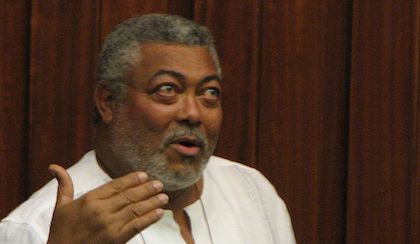Jerry Rawlings. Photo: Wikimedia Commons.
Africa has witnessed many ruinous military coups that led to much death and destruction.
There have also been a few takeovers remembered fondly throughout Africa, such as Thomas Sankara’s in Burkina Faso, and Jerry Rawlings’ in Ghana. Both Sankara and Rawlings wanted the best for Africa; naturally, the two became close friends.
Sankara seized power in 1983. He called on his people to decolonize their minds and create a self-sufficient economy. He told the Burkinabe—as the people became known—that the imported food they consumed was evidence of “…imperialism. Let’s not look any further.”
Burkinabe responded to Sankara’s energy. The people built roads and railways—rolling up their sleeves and joining volunteer work forces. They built hospitals, schools, and they planted millions of trees to stop deforestation. Women were empowered with meaningful jobs and recruited into the army. The country became self-sufficient in food production. Sankara said, “Let’s produce what we consume, and consume what we produce.”
Sankara wanted Africa to renounce the debt collectively to release funds for economic development. At the Organization of African Unity (OAU) meeting in July, 1987, in Ethiopia, he warned that if he renounced the debt alone he would be assassinated by agents of Western imperialism. He was murdered in October 1987.
Jerry Rawlings was a 32-year-old flight lieutenant in Ghana’s air-force when he first seized power in 1979. Ghana was once the pride of Africa. After Kwame Nkrumah was overthrown in 1966, the country became synonymous with military coups, with one incompetent regime after another. Instead of the best of Pan-Africanism, Ghana was linked to soldiers running amok in Africa.
Rawlings had been awaiting execution for a failed earlier coup attempt but was liberated by fellow junior officers and men in the army. Rawlings executed the former military leaders of the country, whom he accused of corruption.
The country was broke and Rawlings rallied Ghanaians to roll up their sleeves and join in massive public works projects. Inflation was in triple digits, the stores had empty shelves, and the hospitals and clinics had no medicine. Rawlings forced U.S. company Kaiser Aluminum, which had been exploiting the country for decades, to renegotiate a contract; Kaiser started paying 300% more for electricity the company used in their production in Ghana.
Rawlings briefly relinquished power to civilian government. He seized power again, accusing the political class of paralysis. After a second military administration, Rawlings introduced civilian government again. He took off his uniform and ran for the presidency as a civilian.
Rawlings was determined to break from Africa’s dependency relations with the West. He cooperated with Libya and Cuba. Later, he succumbed to Western pressures and adopted the neoliberal World Bank project and structural adjustment. He discovered, as Nkrumah warned decades ago—and Sankara paid with his life— that no African country can confront the bitter World Bank medicine alone. Only a united African continent can accomplish that task.
Rawlings voluntarily gave up power after his second term. Since then, Ghana has had several peaceful, transparent, elections; democracy and the rule of law is now taken for granted in Africa. Ghana is once again the pride of Africa. It has one of Africa’s best performing economies. Last year—before the coronavirus pandemic—Ghana welcomed hundreds of thousands of diaspora Africans who celebrated the “Year of Return” in Africa.
Rawlings and Sankara were contrarians. Africa has a long list of corrupt, murderous dictators who seized power by the gun: Mobutu in Congo, Yoweri Museveni in Uganda, Omar Bashir in Sudan, Siyyad Barre in Somalia, to name a few.
Jerry Rawlings passed away today in Ghana at the age of 73. The cause of death was not officially disclosed but Rawlings had reportedly suffered from Allzheimers in recent years.
He is survived by his widow Nana Konadu Agyeman-Rawlings and three children: son, Kimathi Rawlings; and daughters Amina Rawlings; Zanetor Agyeman-Rawlings; Yaa Asantewaa Rawlings.
Rawlings’ legacy to Ghana is democracy, the rule of law, and a country on the march.
May Rawlings rest in peace with his ancestors.








